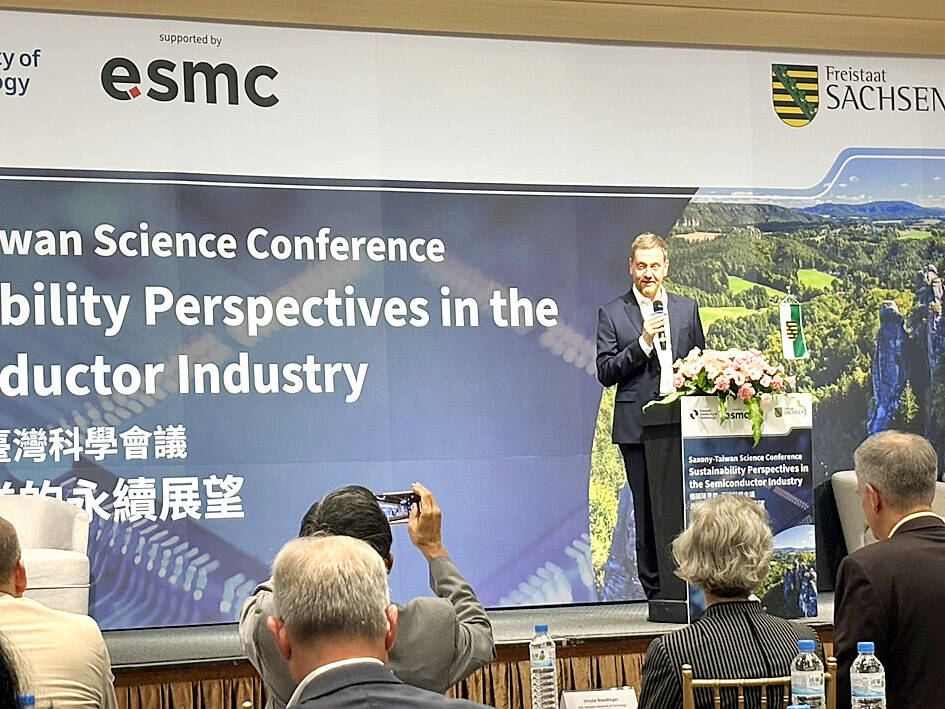Conferences are meant to bring young people from different countries together to tackle the defining challenges of the century, Saxony Minister-President Michael Kretschmer said yesterday in Taipei, adding that Taiwan and Saxony share similar histories of nurturing talent and engineers.
Kretschmer was speaking at the first-ever Saxony-Taiwan Science Conference, a forum aimed at deepening cooperation in the semiconductor and electronics sectors.
At the opening ceremony, Kretschmer said the one-day event was a continuation of a series of similar conferences held in Dresden, the capital of the German state of Saxony, where Taiwan Semiconductor Manufacturing Co (TSMC, 台積電) is building a wafer fab.

Photo: CNA
“We want to bring minds together from all over the world to tackle these challenges,” Kretschmer said, adding that the chip and microelectronic sectors are key to tackling those challenges.
Kretschmer said that Saxony and Taiwan have similar histories.
“We started with the chip industry in Saxony, and built on our talents and our engineers, and developed into the prime location for the chip industry in Europe,” he said via an interpreter.
Speaking at the same ceremony, Saxony State Minister of Science Sebastian Gemkow said that Taiwan and Saxony are both known worldwide as centers of excellence, and he welcomed TSMC’s investment in the state.
“We are proud that Taiwan’s largest company, TSMC, has chosen Saxony as a location for its future investment. This is not only a signal of confidence in our economy, but also a strong trend for us in education,” he said.
Meanwhile, National Science and Technology Council Deputy Minister Chen Bing-yu (陳炳宇) said Taiwan and Germany are committed to developing more energy-efficient technologies to build a sustainable future.
“Today’s conference will focus on promoting sustainability in semiconductors. I firmly believe our mutual strengths can deliver groundbreaking solutions in this field,” Chen said.
The Saxon Science Liaison Office Taiwan — which organized the event, titled “Sustainability Perspectives in the Semiconductor Industry” — said it aims to provide a platform for Saxony and Taiwan to forge strategic alliances with universities, research institutes, and industry partners to address global challenges and advance sustainable development in the electronics sector.
TSMC started to build a fab in Dresden in August last year, and construction is scheduled to be completed in 2027 to cater to the European auto market and the industrial sector.
TSMC holds a 70 percent stake in the venture, known as European Semiconductor Manufacturing Co (ESMC).
Robert Bosch GmbH and Infineon Technologies AG, both based in Germany, and Netherlands-based NXP Semiconductors NV each hold a 10 percent share in ESMC.

NEW IDENTITY: Known for its software, India has expanded into hardware, with its semiconductor industry growing from US$38bn in 2023 to US$45bn to US$50bn India on Saturday inaugurated its first semiconductor assembly and test facility, a milestone in the government’s push to reduce dependence on foreign chipmakers and stake a claim in a sector dominated by China. Indian Prime Minister Narendra Modi opened US firm Micron Technology Inc’s semiconductor assembly, test and packaging unit in his home state of Gujarat, hailing the “dawn of a new era” for India’s technology ambitions. “When young Indians look back in the future, they will see this decade as the turning point in our tech future,” Modi told the event, which was broadcast on his YouTube channel. The plant would convert

‘SEISMIC SHIFT’: The researcher forecast there would be about 1.1 billion mobile shipments this year, down from 1.26 billion the prior year and erasing years of gains The global smartphone market is expected to contract 12.9 percent this year due to the unprecedented memorychip shortage, marking “a crisis like no other,” researcher International Data Corp (IDC) said. The new forecast, a dramatic revision down from earlier estimates, gives the latest accounting of the ongoing memory crunch that is affecting every corner of the electronics industry. The demand for advanced memory to power artificial intelligence (AI) tasks has drained global supply until well into next year and jeopardizes the business model of many smartphone makers. IDC forecast about 1.1 billion mobile shipments this year, down from 1.26 billion the prior

People stand in a Pokemon store in Tokyo on Thursday. One of the world highest-grossing franchises is celebrated its 30th anniversary yesterday.

Zimbabwe’s ban on raw lithium exports is forcing Chinese miners to rethink their strategy, speeding up plans to process the metal locally instead of shipping it to China’s vast rechargeable battery industry. The country is Africa’s largest lithium producer and has one of the world’s largest reserves, according to the US Geological Survey (USGS). Zimbabwe already banned the export of lithium ore in 2022 and last year announced it would halt exports of lithium concentrates from January next year. However, on Wednesday it imposed the ban with immediate effect, leaving unclear what the lithium mining sector would do in the